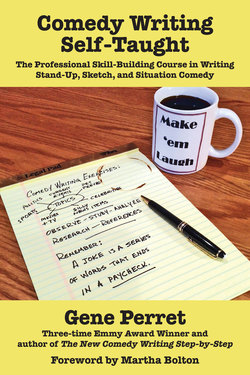Читать книгу Comedy Writing Self-Taught - Gene Perret - Страница 12
На сайте Литреса книга снята с продажи.
ОглавлениеPart One: Joke Writing
A Brief Introduction to Joke Writing
A joke is anything that makes people laugh. A joke can be a series of words, an action, a reaction. It can even, in certain instances, be strategic silence.
A joke is the basic building block of humor. It’s the smallest unit of comedy, yet it’s necessary to build the larger constructions of comedy—sketches, sitcoms, essays, films, and books. Master the joke form and you’ve got a solid foundation for writing all types of humor.
The single most important element of comedy is surprise. Every joke must have a punchline. That’s the surprise. That’s what prompts the laughter. Comics and comedy writers must remember that if you don’t prompt the laughter, you probably won’t get laughter. You must tell the audience when to laugh. It’s too important to leave to their discretion.
Jokes also have an economy to them—an economy of words. Shakespeare said, “Brevity is the soul of wit.” It’s usually beneficial in writing jokes to be concise. However, each joke must convey a certain amount of information. If you’re going to tell an audience when to laugh, you have an obligation to tell them what they’re laughing at. You have to supply enough data for them to get the joke. At the same time, though, you don’t want to supply so much information that you dilute the gag or tip off the essential surprise.
Your jokes should also be clever. You want to bring uniqueness to your humor. You want to offer your audiences something they never thought of on their own. Either that or you want to present something they all know and recognize with different, offbeat phrasing. In other words, you want to avoid the obvious. Strive to say something different or say something ordinary in a different way.
Jokes are important to all forms of humor, so it’s essential for aspiring humorists to teach themselves to write jokes. Some writers who are primarily interested in other forms of writing besides stand-up may be tempted to skip over these lessons. In a word, don’t—for many reasons.
Joke writing is good training in observation. You have to see the humor around you before you can condense it into a powerful one-liner. That’s a talent that is certainly required in crafting a story.
Joke writing develops a facility with words. The exact word and precise phrasing can often make or break a joke. Certainly an extensive and colorful vocabulary coupled with scrupulously correct phrasing will benefit writers of all genres.
Also, even though they are the smallest unit of humor, jokes have a dramatic construction of their own. Each one tells its own tale. If you teach yourself to construct a joke well, you’ll also gain experience in telling a story well.
Regardless of which type of comedy writing you aspire to, devote a generous amount of time to learning to write gags. Mark Twain wrote some pretty quotable quips. Oscar Wilde did, too. Both were accomplished writers.
Teach yourself to write one-liners. Do some of the practice exercises. It will pay dividends.
